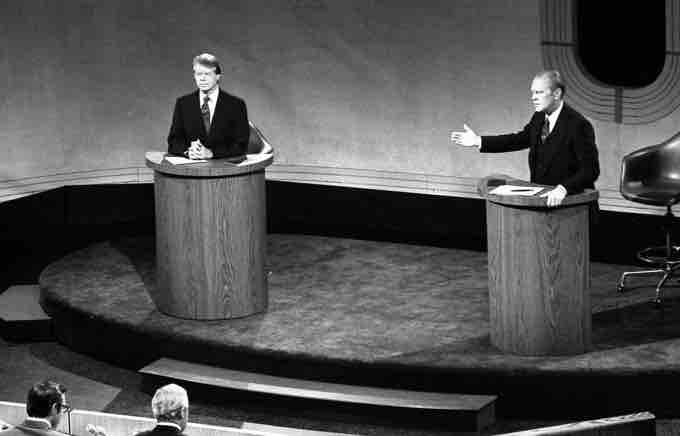The United States presidential election of 1976 followed the resignation of President Richard Nixon and subsequent inauguration of Vice President Gerald Ford into the presidency in the wake of the Watergate scandal. It favored the relatively unknown former Democratic governor of Georgia, Jimmy Carter, against the incumbent Republican President Ford.
The Primaries
The Republican Party
The contest for the Republican Party's presidential nomination in 1976 was between two serious candidates: Gerald Ford, incumbent president and leader of the GOP's moderate wing, and Ronald Reagan, the leader of the GOP's conservative wing and the former two-term governor of California. The presidential primary campaign between the two men was hard-fought and relatively even. By the start of the Republican Convention in August of 1976, the race for the nomination was still too close to call. Ford defeated Reagan by a narrow margin and chose Senator Robert Dole of Kansas as his running mate, in place of incumbent Vice President Nelson Rockefeller. The 1976 Republican Convention was the last political convention to open with the presidential nomination still being undecided until the actual balloting at the convention.
The Democratic Party
Jimmy Carter ran in the Democratic Party as a reformer who was "untainted" by Washington political scandals. Largely unknown in politics at the time, he ran as a "dark horse," or a little-known person emerging to prominence that seemed unlikely to succeed. Carter ran on an “anti-Washington” ticket, making a virtue of his lack of experience in what was increasingly seen as the corrupt politics of the nation’s capital. Accepting his party’s nomination, the former governor of Georgia pledged to combat racism and sexism as well as overhaul the tax structure. He openly proclaimed his faith as a born-again Christian and promised to change the welfare system and provide comprehensive healthcare coverage for neglected citizens who deserved compassion. Most importantly, Jimmy Carter promised that he would “never lie.”
The Campaign
Because many voters found Carter's framing attractive in the wake of the Watergate scandal, it ultimately led to Carter's advantage. Ford, although personally unconnected with Watergate, was seen by many as too close to the discredited Nixon administration; Ford himself provided further support for this opinion when he granted Nixon a presidential pardon for any crimes he might have committed during his term of office. As a result of the pardon, his popularity in public-opinion polls plummeted. Ford's refusal at the time to publicly explain his reasons for pardoning Nixon only hurt his image more (though he would later offer explanation in his memoirs). His son, Jack Ford, gave an interview in 1976 in which he stated that his father felt that he "(doesn't) have to prove anything" regarding the pardon of Nixon, and thus did not feel compelled to talk about it.
One of the advantages Ford held over Carter as the general election campaign began was that, as President, he was privileged to preside over events dealing with the United States Bicentennial. This position often resulted in favorable publicity for Ford. The Washington, D.C. fireworks display on the Fourth of July was presided over by the President and televised nationally. On July 7, 1976, the President and First Lady served as hosts at a White House state dinner for Queen Elizabeth II and Prince Philip of the United Kingdom, which was televised on the Public Broadcasting Service (PBS) network. These events were part of Ford's "Rose Garden" strategy to win the election: instead of appearing as a typical politician, Ford presented himself as a "tested leader" who was busily fulfilling the role of national leader and Chief Executive. Not until October did Ford leave the White House to actively campaign across the nation.
After the Democratic National Convention, Carter held a huge 33-point lead over Ford in the polls. However, as the campaign continued, the race greatly tightened. During the campaign, Playboy magazine published a controversial interview with Carter; in the interview, Carter admitted to having "lusted in my heart" for women other than his wife, which cut into his support among women and evangelical Christians. On September 23, Ford performed well in what was the first televised presidential debate since 1960. Polls taken after the debate suggested most viewers felt that Ford was the winner. Carter was also hurt by Ford's charges that he lacked the necessary experience to be an effective national leader and was vague on many issues.
Results
The states that ultimately secured Carter's victory were Wisconsin (at a 1.68% margin) and Ohio (at a .27% margin). Had Ford won these states along with the other states he carried, he would have won the presidency. The 27 states Ford won were and remain the most states ever carried by a losing candidate.
Carter was the first Democrat since John F. Kennedy in 1960 to carry the states of the Deep South and the first since Lyndon Johnson in 1964 to carry an unquestionable majority of southern states. Carter performed very strongly in his home state of Georgia, carrying 66.7% of the vote and every county in the state. His 50.1% of the vote was the only time since 1964 that a Democrat managed to obtain a majority of the popular vote in a presidential election, until Barack Obama won about 53% of the vote 32 years later. Carter is one of five Democrats to gain a majority of the popular vote since the American Civil War, with the others being Samuel Tilden, Franklin Roosevelt, Lyndon Johnson, and Barack Obama.
Had Ford won the election, the provisions of the 22nd amendment would have disqualified him from running in 1980 because he had served more than two years of Nixon's remaining term.

Carter and Ford in a Debate, September 23, 1976
President Gerald Ford and Democratic nominee Jimmy Carter meet at the Walnut Street Theater in Philadelphia to debate domestic policy during the first of the three Ford-Carter Debates.